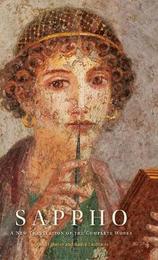
|
Sappho: A New Translation of the Complete Works
Hardback
Main Details
Description
Sappho, the earliest and most famous Greek woman poet, sang her songs around 600 BCE on the island of Lesbos. Of the little that survives from the approximately nine papyrus scrolls collected in antiquity, all is translated here: substantial poems, fragments, single words - and, notably, five stanzas of a poem that came to light in 2014. Also included are new additions to five fragments from the latest discovery, and a nearly complete poem published in 2004. The power of Sappho's poetry - her direct style, rich imagery, and passion - is apparent even in these remnants. Diane Rayor's translations of Greek poetry are graceful and poetic, modern in diction yet faithful to the originals. The full range of Sappho's voice is heard in these poems about desire, friendship, rivalry, family, and 'passion for the light of life'. In the introduction and notes, internationally respected Sappho scholar Andre Lardinois presents plausible reconstructions of Sappho's life and work, the importance of the recent discoveries in understanding the performance of her songs, and the story of how these fragments survived.
Author Biography
Diane Rayor is Professor of Classics at Grand Valley State University. In 2011, she received the university's most prestigious faculty award, the Glenn A. Niemeyer Outstanding Faculty Award for excellence in teaching, scholarship, and service. In 2010, Colorado College awarded Rayor the Doctor of Humane Letters, honoris causa. Rayor has published five book translations of ancient Greek poetry and drama: Euripides' 'Medea': A New Translation (Cambridge University Press, 2013); Sophocles' 'Antigone': A New Translation (Cambridge University Press, 2011); Homeric Hymns: A Translation, with Introduction and Notes (2004); Sappho's Lyre: Archaic Lyric and Women Poets of Ancient Greece (1991); and Callimachus (with S. Lombardo, 1988). She is coeditor of Latin Lyric and Elegaic Poetry (1995). Her translations appear in numerous anthologies, including Greek Poets: Homer to the Present (2009), which contains sixteen of her translations.
Reviews'Even the tiniest scraps can be potent, as Rayor's lucid and comprehensive translation makes clear ... Diane J. Rayor captures the distinctively plainspoken quality of Sappho's Greek, which, for all the poet's naked emotionality and love of luxe, is never overwrought or baroque.' Daniel Mendelsohn, The New Yorker 'For readers who want a complete, up-to-date collection of all Sappho's extant oeuvre in faithful and cautious English translation, this new edition, by two acclaimed classical scholars, is currently the sole satisfactory option ... Almost everything an undergraduate or interested lay reader requires to embark on a first voyage into Sappho's world can be found within this elegant volume.' Edith Hall, The New York Review of Books 'Rayor's translations allow the poetry of Sappho to shine. Every piece of what remains of Sappho's songs is reproduced here, including the most recent discoveries, thereby providing the reader with the most comprehensive English collection available. A wonderful and inspiring work.' Marguerite Johnson, University of Newcastle, Australia 'This book joins an eloquent translation of Sappho's wide range of expression with a judicious guide to problems of text and interpretation. The combination provides a reliable and enjoyable introduction to Sappho's poetry and a firm basis for discussion of the many responses it has evoked.' Joel Lidov, City University of New York 'Diane Rayor's translation captures the quality of Sappho's poetry: seemingly simple, but luminous, with unexpected shifts of perspective that change the meaning. Neither too literal nor too free, her lucid, musical rendering of Sappho's Greek is a delight to read, and to read aloud.' Eva Stehle, University of Maryland 'With lovely translations and lucid commentary, Rayor and Lardinois re-create the Sapphic fragments (including several rediscovered in our own century) in subtle colors, presenting Sappho like Aphrodite on her 'throne of many hues'. This volume is a welcome addition to the long tradition of translating Sappho; ideal for students and teachers, and a delight to all readers eager to read Sappho anew.' Yopie Prins, University of Michigan 'This is the best version of Sappho in English.' Thomas L. Cooksey, Library Journal 'This excellent new translation of Sappho by Rayor ... will appeal to the general public as well as scholars of Sappho and classicists ... Rayor offers versions of all the poems known today, including two fragments published as recently as 2014. The excellent introduction to Sappho's times and opus by Lardinois provides the necessary background in clear, elegant, jargon-free language; the notes are concise but informative. Highly recommended.' P. Nieto, Choice 'Anyone with an interest in Sappho will want to add this to their library: It includes a thorough scholarly introduction, copious notes, all extant fragments, an appendix on the new poem, and unvarnished translations that hew dutifully to the originals. Usefully, the authors have set forth the fragments in 'order', rather than grouping them by subject, making it easier to track down a specific fragment.' The Weekly Standard 'This beautiful book offers exactly what it says on its cover: a new translation of the complete works of Sappho. The fullness and quality of the work make it a wonderful resource for the Greekless, and it will be of considerable value to students of classical literature too. Cambridge University Press deserves our thanks for producing such an accurate and attractive volume at such a reasonable price.' Bryn Mawr Classical Review
|